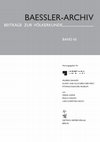Papers by Ilja Labischinski

ENTZUG, TRANSFER, TRANSIT: Menschen, Objekte, Orte und Ereignisse. 20 Jahre Arbeitskreis Provenienzforschung e.V., 2024
Provenance research for objects from colonial contexts at the Ethnologisches Museum and the Museu... more Provenance research for objects from colonial contexts at the Ethnologisches Museum and the Museum für Asiatische Kunst, both part of Staatliche Museen zu Berlin, is a main focus of public interest, not least because of their move to the Humboldt Forum. Since 2019, our team of provenance researchers based in the Zentralarchiv has concentrated on the issue how the vast collection holdings of the Ethnologisches Museum and the Museum für Asiatische Kunst may be researched systematically and in cooperation while taking the postcolonial presence into consideration.
Our paper will present our position and the resulting practice of postcolonial provenance research, as well as consider the question how provenance research can be systematized and prioritized in collections of one million objects above and beyond quantitative investigations of chains of acquisition. As we understand it, postcolonial provenance research refers to the period of acquisition and the translocation history of the objects on the one hand, and to methods and objectives of research on the other. We approach research as an open, cooperative, and powercritical process which may either lead to a reactivation of collection holdings or to their restitution. The objective is the establishment of a cooperative and sustainable research process with multiple knowledge producers while giving scope for diverse forms of knowledge, including historical accounts as well as current experiences and interpretations, and to allow future visions. In this way, postcolonial provenance research will also create new relational ethics between museums and their staff, people from diasporas, political activists, and representatives from so-called source communities.
Der Freitag, 2020
Der Streit um das Humboldt-Forum berührt Grundfragen: Brauchen wir Museen und Sammlungen? Eine In... more Der Streit um das Humboldt-Forum berührt Grundfragen: Brauchen wir Museen und Sammlungen? Eine Innenansicht aus dem Berliner Ethnologischen Museum
Boas Blog, 2020
Ilja Labischinski, Provenienzforscher bei den Staatlichen Museen zu Berlin, schildert im folgende... more Ilja Labischinski, Provenienzforscher bei den Staatlichen Museen zu Berlin, schildert im folgenden Text seine Erfahrungen aus der Zusammenarbeit mit dem Nebraska Indian Community College anlässlich der Vorbereitungen für eine Ausstellung im Humboldt Forum in Berlin. Er endet mit zehn Fragen zu Möglichkeiten und Grenzen der Kooperation mit Stakeholdern aus den Herkunftsstaaten und -gesellschaften der musealisierten Objekte.

Between 1881 and 1883, Johan Adrian Jacobsen travelled the American Northwest Coast and Alaska on... more Between 1881 and 1883, Johan Adrian Jacobsen travelled the American Northwest Coast and Alaska on behalf of the Königliches Museum für Völkerkunde Berlin to collect ethnographic material. In November 2015, more than 130 years later, a delegation of the Chugach Alaska Corporation and the Chugachmiut visited the Berlin Museum to get to know the objects that were once collected from their home, the Prince William Sound. A few months later, in February 2016, a member of the delegation and representative of the Chugach Alaska Corporation,
John Johnson, asked the museum for support to track down and repatriate human remains and funeral objects of the Jacobsen collection. This was the starting point of collaboration between
the Ethnologisches Museum Berlin and the Chugach Alaska Corporation. This paper will give an overview of the history of the collection from Southcentral Alaska, the material heritage of the Chugach in Berlin and give an inside view of collaboration in the making of the Humboldt
Forum.
"Seamos Moros" escribió el héroe nacional cubano, José Martí, en 1893 en apoyo a la rebelión de l... more "Seamos Moros" escribió el héroe nacional cubano, José Martí, en 1893 en apoyo a la rebelión de los beréberes en contra del dominio español en el norte de Marruecos. Habiéndolo
Books by Ilja Labischinski
Museumssammlungen sind das Ergebnis von Beziehungen. Provenienzforschung macht die Herkunft und d... more Museumssammlungen sind das Ergebnis von Beziehungen. Provenienzforschung macht die Herkunft und die Beziehungsgeschichten hinter den Objekten sichtbar und hinterfragt die ungleichen Machtbeziehungen, die hinter den Erwerbungen der Objekte stehen.








Uploads
Papers by Ilja Labischinski
Our paper will present our position and the resulting practice of postcolonial provenance research, as well as consider the question how provenance research can be systematized and prioritized in collections of one million objects above and beyond quantitative investigations of chains of acquisition. As we understand it, postcolonial provenance research refers to the period of acquisition and the translocation history of the objects on the one hand, and to methods and objectives of research on the other. We approach research as an open, cooperative, and powercritical process which may either lead to a reactivation of collection holdings or to their restitution. The objective is the establishment of a cooperative and sustainable research process with multiple knowledge producers while giving scope for diverse forms of knowledge, including historical accounts as well as current experiences and interpretations, and to allow future visions. In this way, postcolonial provenance research will also create new relational ethics between museums and their staff, people from diasporas, political activists, and representatives from so-called source communities.
John Johnson, asked the museum for support to track down and repatriate human remains and funeral objects of the Jacobsen collection. This was the starting point of collaboration between
the Ethnologisches Museum Berlin and the Chugach Alaska Corporation. This paper will give an overview of the history of the collection from Southcentral Alaska, the material heritage of the Chugach in Berlin and give an inside view of collaboration in the making of the Humboldt
Forum.
Books by Ilja Labischinski
Our paper will present our position and the resulting practice of postcolonial provenance research, as well as consider the question how provenance research can be systematized and prioritized in collections of one million objects above and beyond quantitative investigations of chains of acquisition. As we understand it, postcolonial provenance research refers to the period of acquisition and the translocation history of the objects on the one hand, and to methods and objectives of research on the other. We approach research as an open, cooperative, and powercritical process which may either lead to a reactivation of collection holdings or to their restitution. The objective is the establishment of a cooperative and sustainable research process with multiple knowledge producers while giving scope for diverse forms of knowledge, including historical accounts as well as current experiences and interpretations, and to allow future visions. In this way, postcolonial provenance research will also create new relational ethics between museums and their staff, people from diasporas, political activists, and representatives from so-called source communities.
John Johnson, asked the museum for support to track down and repatriate human remains and funeral objects of the Jacobsen collection. This was the starting point of collaboration between
the Ethnologisches Museum Berlin and the Chugach Alaska Corporation. This paper will give an overview of the history of the collection from Southcentral Alaska, the material heritage of the Chugach in Berlin and give an inside view of collaboration in the making of the Humboldt
Forum.